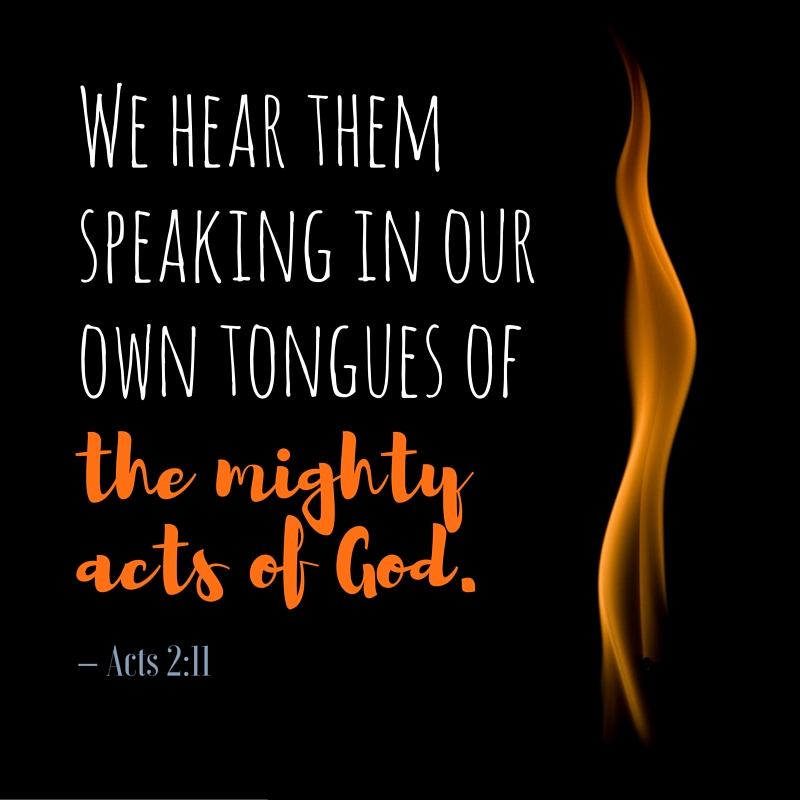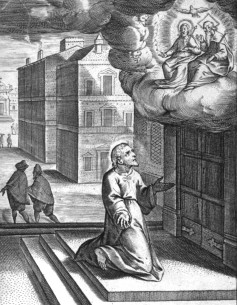The Apostles spent a lot of their time after Christ’s Ascension trembling in rooms. None of them knew what to do after Christ had returned to the Father, especially after leaving them without a lot to go on. How could they speak this truth to the world around them and not feel vulnerable? Nobody would believe that their master had returned from the dead, walked the earth for a time, and returned to the one true God amidst a culture where the Roman emperor was thought to be the only Son of God, and where those who tried to deviate from this truth were persecuted or killed. Moreover, their Jewish brothers and sisters probably had a hard time understanding this as well. They must have wondered how a wonder-worker who was the son of a virgin and a wood worker in Nazareth could be understood as the true Son of God, especially after all of the things this man had done over the course of time.
 The Language of Truth
The Language of Truth
This truth of Christ was like a strange language. Speaking in a new language is scary. Trying to formulate coherent thoughts using unfamiliar words and verb conjugations is a very vulnerable position to be in. Native speakers may look at someone learning a new language with blank stares, trying their best to understand what he or she is saying. Some will shake their head and smile, doing their best to pick out the core meaning of the statements. Others, more likely than not, will just smile and nod and make affirming noises without understanding anything said, turning to those who understood to try and clarify the meaning. This exchange between language learners and native speakers leaves the learner feeling inadequate and anxious that their words have been misunderstood or misconstrued. I can only imagine that the Apostles were feeling similar in these times, trying to speak the truth of what they had experienced with Jesus.
People who learn how to speak new languages are courageous. The desire to communicate with others outweighs the fear and vulnerability that comes with speaking a new language. This desire propels one to reach out to others and speak, even if he or she is misunderstood or misconstrued. By taking a chance and speaking to others in their native language, he or she is showing that the fear of being misunderstood will not overtake their desire to communicate and ultimately connect. These new connections are characterized by a spirit of freedom to express one’s self, a spirit of intrepid relationship building, a spirit of fearlessness amidst anxiety and inadequacy.
 Being Fearless
Being Fearless
This is what the Holy Spirit gives the Apostles in the Gospel this weekend. Peter and his friends receive tongues as if made from fire and begin speaking and understanding every language present in the crowds around them. The people hear them and are astonished, not just because they can understand them, but also because they are speaking at all. And what they are saying is something that they had never understood before: Jesus of Nazareth was the Anointed one of God, the Messiah. The Spirit empowered Peter and the Apostles to proclaim truth to the nations by helping them overcome their anxiety and have the freedom to express themselves, to courageously build new relationships, and to be fearless.
We don’t need to learn a new language like French or Spanish to experience what the apostles experienced. How often are we fearless in speaking languages of justice, compassion, and solidarity to one another? How often do we speak words of compassion to those who think differently than us, whom we consider the “other”? What keeps us trembling in the upper room, unable to speak the truth of God’s love to the world? Let us take the Apostles example this weekend and, with the help of the Holy Spirit, be fearless in the way that our words make God’s love present in this world.









It is of personal opinion that Mr. Wallace falls short as to the depth of what happened in the upper room. Jesus had told his disciples to tarry in Jerusalem until they received power from on high. Even though Peter had walked with the Lord, had even walked on water himself, he had witnessed many miracles; Peter was the one that answered when Jesus had ask his disciples who they thought he was. Peter had answered by saying, “Thou art the Christ the son of the living God.” At the last supper Peter had even told Jesus he would die with him; however Peter not having received the Holy Spirit, in his fear and weakness denied even knowing our Lord. Jesus had breathed the Holy Ghost On his deciples after his death; but still instructed them to tarry until they received power from on high. It was on the day of Pentecost that the mighty rushing wind came into the upper room baptizing them with fire and with the Holy Ghost. Having now received the fullness of the Holy Spirit Within them they now were able to speak with Boldness. There was no fear or apprehension of speaking another language on that particular day. The miracle of that day in speaking to all the devout men that had gathered there and heard the gospel in their own language were then able to go back into their own lands and share the good news. But no there wasn’t any fear, there was just the opposite; there was boldness, which only comes through the infilling of the Holy Spirit.
Forgive me Mr. Wallace, because of the title, I did go back and reread your Post; having done so I can see that you were giving a parallel of how we ordinarily learn another language with the ones from the day of pentecost. The difference of man having to learn for himself and that which had been given from and by the power of the Almighty. I stand corrected, and do apologize for the former post.